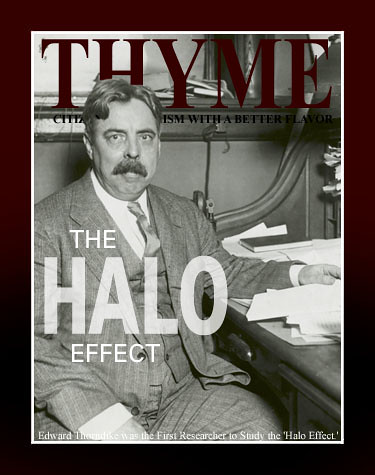
Volume V, Issue XXIII
When Beauty Obscures Truth
The 'other' weekly news magazine this week features The Angelina Effect [click to read]. Lovely Angelina Jolie's surgery puts genetic testing in the spotlight, begging a discussion of 'The Halo Effect.'
How is it possible for a relatively obscure Senator from Illinois, who reporters themselves said of: "We know very little about him;" to rise to the greatest office in the land? Consider the confident appearance, the tailored suits and the general attractiveness the candidate projected. The election was a perfect demonstration of 'The Halo Effect.' Other than those voting for ideological reasons, it was quite clear that youth and virility were being packaged in the 'marketing of a candidate' to the uninformed and undecided.
Psychologist Edward Thorndike first studied the Halo Effect, or halo error, which is a cognitive bias in which one's judgments of a person’s character is influenced by one's overall impression of him or her. This has great implications in settings such as the courtroom and the classroom, where impartiality is essential. Nonetheless, research shows that people perceived as more attractive obtain better judgements in court and often are favored in the educational system.
In his 1920 article “The Constant Error in Psychological Ratings,” [1.] Thorndike presented empirical evidence for his theory. Other psychologists created more elaborate studies in the Nineteen-seventies.
In a pre-media age, it is possible that the Halo Effect was not so ubiquitous. Without a 'national standard' imposed by media images, true beauty was a richer and more diverse pallate. Just as some men prefer blondes or brunettes (this writer is squarely in the brunette camp), beauty can be found in rich diversity if one follows his or her own inclinations without being 'taught' what society at large calls 'beautiful.'
To some extent, the ethnicization of fashion has been a positive influence in reversing a narrow standard of 'beauty,' yet recent reports of the treatment received by a wounded veteran [2.] show that it is hard for people to overcome 'beauty bias.' The man, disfigured by an explosion, was often shunned by people in public, people who never had a chance to learn of the man's heroic service to his country.
My memory wanders back to an autumn in my youth. Some friends and I were hitchhiking to the Outer Banks of North Carolina when an older gentleman picked us up. He was the last lightkeeper of the Hatteras lighthouse and as we rode toward the coast he told us many fascinating stories. He had a severe facial wound of some sort, possibly a wartime injury, but we were too polite to pry. His bright eyes twinkled as he spun his tales! Finally he invited us to join him and travel on to the lighthouse. How I wish we had not felt the constraint of schedule or pre-planned itinerary. I've often remembered that day with lament, wondering what a holiday with this lovely gentleman would have held for us... but we were young, and the sight of Jockey Ridge had us eager to be on our own way.
My point in all this is that beauty has been dumbed-down, much to the detriment of society. I am often amazed to find that the people I find the most attractive do not think of themselves as so. I lament the demise of publications like 'The Sunday Sun Magazine' which featured the photography of A. Aubrey Bodine [3.] They have been replaced with thin tabloids, usually featuring some celebrity on the cover. How fascinating it was to look recently at Readers' Digest's listing of the 100 'Most Trusted' people in America. The top four were ACTORS! [4.], people who PRETEND to be other people! Buried in the middle were men and women of the stature of Billy Graham. The article spoke VOLUMES about America's preoccupation with appearance. Celebrity spokespersons have championed products, causes and campaigns. Congress once held hearings on the plight of farmers... addressed by actors who had PLAYED farm wives! [5.]
Loveliness is a wonderful thing. Beauty and truth are to be celebrated, but outward appearance cannot always be trusted as an indication of inward virtue.





No comments:
Post a Comment